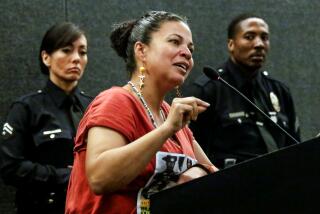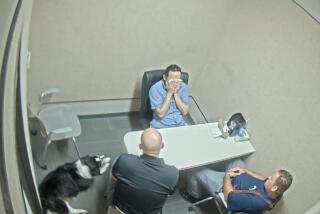He Survived Beatings, Torture, Betrayal and Bullets to Tell His Story
- Share via
SRINAGAR, India — His gaunt frame scarred with gruesome burns and bullet wounds, Masroof Sultan is living proof of India’s campaign of terror in Kashmir.
Early on April 8, the 19-year-old student was on his way to college chemistry exams when paramilitary troops from India’s feared Border Security Force stopped his bus. All the men were ordered off at gunpoint.
As the hours dragged by, dozens and then hundreds of men from passing vehicles were herded into a field. Each was paraded before a dozen or so hooded informers, whose job was to point out Muslim militants fighting a bloody four-year secessionist war against India.
Sultan does not know who accused him, or why. “Suddenly, all the security men came up and started hitting and kicking me,” he said.
Four soldiers blindfolded Sultan with his sweater, tied his hands and forced him onto the floor of a mini-truck. He was taken to a nearby office.
“They told me, ‘Take off your clothes.’ I opened my clothes and they took a stick and tied it under my knees. Then they lifted me by the stick and began beating me. They kept saying, ‘You are a militant, show us the guns and hide-outs.’ . . . That is when they fractured my upper right femur (his thigh).”
When he insisted he was just a student, an officer ordered him taken to “Papa Two,” a tree-shaded, red-brick former government guest house that Indian security forces use as their chief interrogation center.
Before he was taken away, his parents arrived and pleaded with the officers for his release. “The officer told me, ‘Look at your mother’s face,’ ” Sultan recalled. “ ‘This is the last time you will see her.’ ”
At Papa Two, he was put in a small room with a bare bulb and a panel filled with electric switches. He was ordered to strip and his arms and ankles were tied. Raw electric wires were clipped to his toes and testicles, and water was poured over his body.
“After three shocks, you will confess everything,” Sultan was told. Instead, he began bleeding from the nose and mouth and lost consciousness. When he awoke, the soldiers shocked and beat him until he passed out again.
That night, Sultan said, the soldiers drove him back to the office where he had been beaten that morning. “They say: ‘You are not a militant. We believe that. But we have to kill you. Four of our men were killed yesterday. Here, everyone is a militant. Even the children are militants.’ ”
He was loaded into the mini-truck, driven across a small bridge and shoved against a tall chinar tree on the moonlit banks of a deserted canal. Too weak to stand, he fell to his knees in the tree’s shadow. From under his blindfold, he could see four soldiers and an officer standing on the road about 15 yards away.
“The officer said, ‘One, two three.’ Nothing else. Then they began shooting.”
After the fusillade, a soldier walked over and kicked him. “He said, ‘Sir, the person is still alive.’ He (the officer) said, ‘Shoot at his heart.’ So they shot two bullets at my heart.”
Somehow, he was still alive. “Shoot him in the head,” the officer said.
“The soldier shot, but he missed. I heard the gunshot. Then he shot again. It hit my neck. I held my breath and pretend to be dead when he grabs me. He said, ‘Sir, the person has died.’ ”
Before leaving, the soldiers stole Sultan’s sweater and watch. Later that night, they called the local police and told them to pick up the corpse of a militant killed in cross-fire, the language Indian officials use whenever a civilian is tortured to death or executed in Kashmir.
The police took him to the Government Bone and Joint Surgery Hospital in Barzullah, a Srinagar suburb, where astonished doctors determined that Sultan was alive and that none of the bullets had punctured vital organs or vessels.
Sultan, a Muslim, attributes his survival to prayer. “I was praying to God, and God saved me,” he said.
After four operations, he was discharged June 11. His hospital record reports bullet wounds in both thighs, both arms, his neck and chest. The record lists Sultan’s injuries as “grievous,” his disability “permanent.” Sultan walks with a limp and says he needs at least two more operations.
In interviews, the commanders of India’s military and police forces in Kashmir angrily denied reports that hundreds of detainees have been tortured and executed by Indian forces, and they especially denied knowing anything about Sultan’s case.
Kashmir’s governor, retired GenV. Krishna Rao, said he had ordered that all reports of torture and summary executions be investigated. He said he has never visited Papa Two and is unaware of Sultan’s case.
“I don’t know,” he shrugged. “It must be getting investigated.”
But Sultan said no one from the government has interviewed him.
Today, he hides in a small brick home, terrified that the soldiers will return to finish their work. Relatives say he weeps and shakes uncontrollably when he sees uniformed men. He wants to go abroad.
“I am very afraid,” Sultan said softly. “I think I am not safe. I think I am in danger.”
More to Read
Sign up for Essential California
The most important California stories and recommendations in your inbox every morning.
You may occasionally receive promotional content from the Los Angeles Times.










